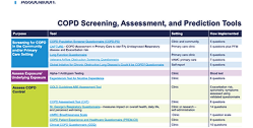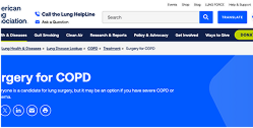COPD Supportive Therapies
In some cases, people with COPD might need supplementary treatment options to support their COPD management and care, particularly if they are at risk of an exacerbation or recently had a COPD-related emergency.
Below are some examples of COPD supportive therapies to supplement standard COPD treatment. These supplementary therapies may be provided directly by your health care provider or involve a referral to access.
Your health care provider may recommend or refer you for Pulmonary rehab. This is a program that combines physical activity and education to help people with chronic breathing difficulties, including COPD, maintain and improve their ability to do the things they want to do.
Pulmonary rehab often includes a mix of supervised exercise and a home workout schedule to strengthen lung capacity and overall fitness. It can help improve quality of life and provide additional focused education on self-management tools to manage COPD by helping you understand COPD better, learn about your medications and devices, recognize your triggers, develop nutritional plans, and improve your quality of life through strength and endurance training.
Discuss a pulmonary rehabilitation program with your health care provider to help improve lung function.
According to the National Institutes of Health, pulmonary rehabilitation can help reduce COPD symptoms, increase physical activity, improve daily life function, and improve emotional health.
Some people may need to be prescribed Oxygen to help provide a continuous flow of oxygen to those with breathing difficulties or low oxygen levels. Oxygen therapy can be provided in a hospital, as well as at home. If you are prescribed supplemental oxygen, discuss with your health care provider what type of oxygen delivery device best meets your needs and lifestyle as there are different types including oxygen tanks you pull around or carry in a backpack. Supplemental oxygen is a regulated drug and needs to be taken as prescribed.
Your provider might prescribe you a machine to help support your breathing by reducing the work your lungs need to do. This support is particularly helpful for those who struggle with breathing at night or during naps; it uses the same type of machine someone might use for sleep apnea. This type of ventilatory support delivers oxygen through a face mask, and not a tube or airway, and is therefore considered a “non-invasive” ventilation support.
Palliative Care can be helpful at any stage of COPD to support you and your family with treatment planning, surgery, stress, and navigating the medical system, and focuses on improving the quality of life of an individual living with serious illnesses, like COPD. Palliative Care also helps manage pain, breathing difficulty, and emotional stress.
Individuals with COPD are also likely to have co-morbidities, particularly heart disease. Vermont offers free, online healthy lifestyle workshops created by the CDC and led by local health coaches through MyHealthyVT.org. Workshops are available on a variety of topics and conditions, including prediabetes, diabetes, high blood pressure, tobacco use, and chronic disease and chronic pain management. Your provider my recommend one of these workshops to help with your COPD self-management and overall care and support.
Your health care provider might recommend and make other referrals for services that might further support your COPD management and care. Depending on availability and your personal needs, you might be recommended any of the following additional supplementary supports:
- Nutritional/dietary supports
- Stress/anxiety/mental health screening and supports
- Supplementary COPD patient education
- Home visiting to address environmental triggers
- Smoking Cessation
- Vaccinations
Advanced COPD Care
Advanced Therapies
Some patients, as their COPD progresses, will require more advanced therapies for COPD. There are many different options for treatment depending on each person’s COPD symptoms and situation, so be sure to work together with your provider to ensure treatment plans fit your unique needs.
Most health care systems and practices maintain robust networks of health care professionals and referral protocols to ensure comprehensive care for COPD patients, especially as they progress to later stages of COPD. Your team of health care professionals might include a primary care provider, physicians, pulmonologist, nurses (RN), respiratory therapist (RT), physical therapists (PT), care coordinators, nutrition specialist, mental health worker, family members and other caregivers you will be able to rely on to help and support you in managing your COPD.
Below are some examples of Advanced COPD Therapies and Care options:
an antibiotic that has been shown to improve lung function and reduce the number of pulmonary exacerbations in patients.
a medicine for patients with severe COPD to decrease exacerbations and improve lung function.
when medical treatment is no longer sufficient, surgical interventions may help. Surgical interventions have been shown to improve symptoms, exercise tolerance, and overall quality of life.
- Endobronchial Valve (EBV) Therapy: According to the American Lung Association, EBVs are “removable, one-way valves that reduce lung hyperinflation by allowing the trapped air to escape”.
- Surgery: Surgery, such as lung volume reduction survey and lung transplants, may be considered for some people with COPD who have severe symptoms.
Hospice
Hospice focuses on comfort and improving quality of life, rather than just trying to cure or treat an illness. Many people find it helpful to talk about their life goals or “bucket list” items during this time - so you can focus on what truly matters while you’re able.
Hospice Care is designed for people with advanced COPD or who are nearing the end of life. It focuses on keeping you comfortable at home or in a hospice facility. Hospice Care can provide support for family and caregivers as well.
Learn more about many of these advanced treatment options on the American Lung Association’s webpage, How Is COPD Treated?.
Advance Directives: An advance Directive is a written document that outlines an individual’s wishes for medical treatment in the future, including if they are no longer able to make those decisions.
Create or change an advance directive to ensure your wishes for future medical treatment are documented.
Advance directives are written documents that outline an individual’s wishes for medical treatment in the future, including if they are no longer able to make those decisions. Create or chance an advance directive by visiting the VDH Advance Direct webpage.




